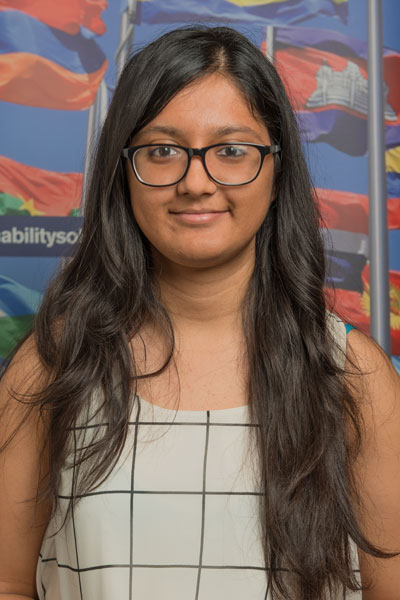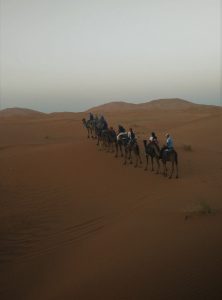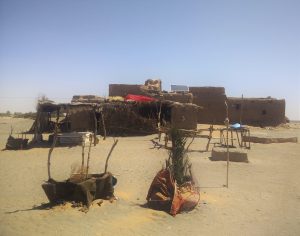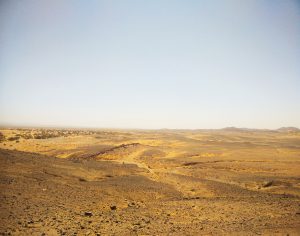
Door to the Sahara
Merzuga lies at the edge of the Sahara desert. Sand dunes stretch out behind it for as far as the eyes will go. We rode camels for an hour to camp in the middle of the Sahara. It was close enough to still be able to see the town lights in the distance from the top of a dune, but far enough to experience the sun, the sand, the wind and the stars, and to imagine what it must be like to get lost in the endless ocean of sand in search for the kind of land that men could “conquer”.
 We were lucky to be in the desert on one of the more peaceful nights. The wind was gentler, allowing us to sit outside and watch the sun go down and the stars come up. The sky was clear and we entertained ourselves by talking about life, sharing ghost stories, singing and playing the drums.
We were lucky to be in the desert on one of the more peaceful nights. The wind was gentler, allowing us to sit outside and watch the sun go down and the stars come up. The sky was clear and we entertained ourselves by talking about life, sharing ghost stories, singing and playing the drums.
 The next morning we rode our camels back to the town and after breakfast and baths, explored Merzuga in SUVs. Living on the edge of a desert is never easy and most people we spoke to were haunted by the drought that year – there were fewer camels, sparser vegetation and lesser water than ever before. The sun is abundant though and we saw solar panels installed over households that seemed to have little else.
The next morning we rode our camels back to the town and after breakfast and baths, explored Merzuga in SUVs. Living on the edge of a desert is never easy and most people we spoke to were haunted by the drought that year – there were fewer camels, sparser vegetation and lesser water than ever before. The sun is abundant though and we saw solar panels installed over households that seemed to have little else.
Perhaps one of the most profound experiences of the day – and one that I did not feel comfortable capturing on camera – was meeting the nomads in the area. These people come from families that were traditionally nomadic. Their movement is much restricted now but they still live in moveable tents.
Our SUV stopped next to three tents owned by a woman who lived there with her two sons. As we climbed out of the vehicles, the two children came up to us, curious. One of them knocked a bottle of water out of one of my friend’s hands and ran away. Another one came up to me and pointed to my bag. “Basta,” he said. I knew that the word meant bag.
I wasn’t sure how to communicate with these children. I looked around, trying to memorize the details of what I saw. The tents were made up of pieces of cloth which seemed to be stitched together. They had some chickens in one of the tents in the back and the children chased them for a bit.
Then their mother came out and started preparing Moroccan tea for us. She talked about life in these tents, far away from anything concrete. “It is hard,” she told us. The last few days had been so windy that it had been impossible to do anything but stay inside the tents. She just lives here, and when she needs anything at all, she has people who bring it to her from the town. She left her husband because he was too much trouble and she was better off without him. She wants to send her children to school. “Someday,” she said vaguely. In the meantime, her children brought out a soccer ball to play with but became sullen and stopped when the game got too competitive.
Suddenly another SUV circled the area. The elder son yelled out to it and it stopped. He ran up to it and climbed in. It drove off with him. I looked on in amazement. His mother and brother were nonchalant about the entire incident. I wondered who was in the vehicle, where it was taking him, and why was it not a big deal for his family. Was this something that happened regularly?
 The visit left me with more questions than answers. We talked about them as a group in a class meeting later on. What motivations does this woman have for choosing to live a life like this? What does “choice” even mean for someone like her? How many of her choices have been imposed upon her by circumstances? What would sustainability be for a family like this which is simply struggling to survive on a day-to-day basis? Who even has the right to come and tell them how they should live? But if they did have practical alternative lifestyles that they could choose from, would they?
The visit left me with more questions than answers. We talked about them as a group in a class meeting later on. What motivations does this woman have for choosing to live a life like this? What does “choice” even mean for someone like her? How many of her choices have been imposed upon her by circumstances? What would sustainability be for a family like this which is simply struggling to survive on a day-to-day basis? Who even has the right to come and tell them how they should live? But if they did have practical alternative lifestyles that they could choose from, would they?
One of my friends said it best, “We may not know exactly what right or wrong might be for this woman and her children, but we do know that access to clean water, good healthcare and education is something that she does need.” In the midst of all our conversations about determining the rights and wrongs of sustainability in the desert, this practical thought struck me as an anchor in the Saharan sand.

